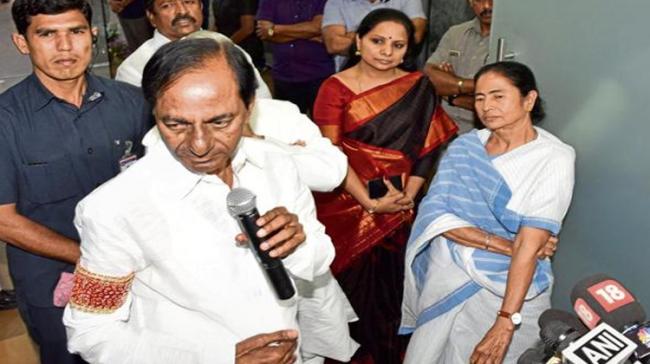Will Anti-BJP Outfits Form Federal Front In 2019?

New Delhi: The anti-BJP front gained currency this year in the wake of BJP's defeats in Kairana, Phulpur and Gorakhpur parliamentary by polls in Uttar Pradesh by the coming together of SP, BSP and RLD and as 2018 winds up the parties are now emboldened to go for the kill against BJP in the coming Lok Sabha polls.
Interestingly, however, the Congress victory in the Hindi heartland in the recent Assembly elections, has come as a dampener for some of the ambitious regional parties who want to have a major say in how the next government is formed.
In that context, rather than a single focussed anti-BJP front, analysts feel the situation is now ripe for a state-level alliances to take on the saffron party and for a Federal Front post Lok Sabha polls depending on the final numbers that come out it. Each regional party, except those like DMK and RJD which have shown their preference for Congress, would like to maximise its gains for acquiring bargaining power after the elections.
There is a unity of purpose in Congress and several other opposition parties to "defeat BJP-RSS" in the Lok Sabha polls and several meetings have been held over the past year to build momentum against the Narendra Modi government.
The year saw efforts by Trinamool Congress leader and West Bengal Chief Minister Mamata Banerjee, TDP leader and Andhra Pradesh Chief Minister N. Chandrababu Naidu and NCP chief Sharad Pawar to bring state parties together along with the Congress on an anti-BJP platform.
The ground for opposition unity was laid by Congress as it held meetings todecide joint candidates for presidential and vice presidential elections. Congress has consolidated its position in the opposition block after ousting BJP from power in Rajasthan, Madhya Pradesh and Chattisgarh but it needs allies in crucial states such as Uttar Pradesh, Bihar, Andhra Pradesh, Tamil Nadu and West Bengal. It has also lost its status as the pre-eminent party of the north-east.
Congress President Rahul Gandhi, who has taken part in joint protests with other parties over policies of the Narendra Modi government, has been talking of the opposition parties together defeating the BJP-led National Democratic Alliance in the 2019 polls.
The meeting of 21 anti-BJP opposition parties earlier this month decided come out with "a programme of work" over the next few months amid growing realisation that state-specific alliances will need to be worked out and a pan-India grand alliance was a near impossibility. But there is still no clarity about how and when these ground level alliances will take shape even though only about four months are left for the general elections.
Even in Bihar, where an alliance between anti-BJP parties is a certainty, there is no clarity of who will fight in how many seats. The BJP-led NDA has sorted out its seat arrangement in the state.
There is already some dissonance visible among the anti-BJP parties with Samajwadi Party and Bahujan Samaj Party not attending the meeting of opposition parties earlier this month called at the initiative of Naidu. There is no clarity if Congress will be part of their proposed tie-up in Uttar Pradesh which sends 80 MPs to Lok Sabha.
Telangana Rashtra Samiti leader K. Chandrasekhar Rao has also revived his efforts to forge a non-BJP, non-Congress platform after returning to power in Telanagana. Parties such as YSR Congress party, Biju Janata Dal, Indian National Lok Dal and Janata Congress Chhattisgarh may find an anti-BJP, anti-Congress platform more suitable to their political ambitions.
Barring states where BJP and Congress are major players or where there is a NDA versus UPA battle, most states are likely to witness a multi-cornered contests in the Lok Sabha polls.
Two important political events next month - Mayawati's birthday on January 15 and the rally being organised by Mamata Banerjee on January 19 - are expected to bring some clarity on how opposition parties will shape their alliances in the Lok Sabha polls.
The anti-BJP parties have common issues against the Narendra Modi government including hardships caused by demonetisation, "flawed" implementation Goods and Service Tax, "misuse" of central agencies to target opponents, "intolerance", "corruption" and farmer distress.
They have also put off the contentious decision of prime ministerial choice after the Lok Sabha elections and DMK leader M K. Stalin's projection of Congress President Rahul Gandhi for the post has not found many takers. BSP chief Mayawati and Mamata Banerjee are seen as the other contenders for the post.
There was also broad opposition unity over demand for joint parliamentary probe on the Rafale fighter jet deal but the Samajwadi Party has seemingly broken ranks after the Supreme Court verdict on pleas seeking a probe. (IANS)
Also Read: Anti-BJP Parties Come Together, But Unlikely To Form Federal Front




